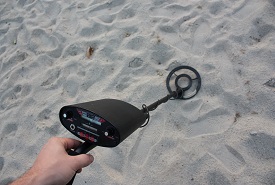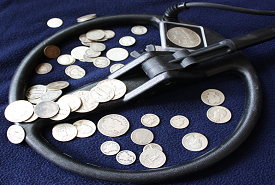There is Treasure Out There But You Have to Know Where to Look! These Are The Best Places to Metal Detect!
If you have your metal detector and the necessary accessories but not sure of where to go, you have come to the right place! Below are what I consider the best places to metal detect based on my personal experience. Depending on what you are searching for should dictate where you hunt of course, but for the purposes of this page I am going to focus on both the older items as well as fresh drops as most of the good places to metal detect will have both. The places mentioned below should give you some ideas on where to metal detect but remember you have to search a potential location thoroughly as even the most heavily metal detected locations can still produce great metal detecting finds. The best place to metal detect is a location that you know well and have documented. Don’t forget to record your finds so you know what areas are producing more than others. Old coins, jewelry, or relics have a funny way of sticking together, that is if you find one, more will follow. Now lets get into what I consider the best places to metal detect!
General Tip on How to Find Good Places to Metal Detect:
Below I will get into specific places to metal detect but a more general piece of advice is to know your surroundings. A great way to find that out without actually moving is google maps. It is amazing all the different locations you can find with Google maps. If I am going somewhere new for the first time (a state or town I have never been to) I always Google map the area to look for the best places to metal detect in that area. There are also plenty of old maps online, just type in the area you are interested in and click Google images to find pictures of old maps. Also, check out historicmapworks.com. This website is great for researching old maps. One thing to keep in mind is if it was easy for you to find a location then it was easy for another metal detectorist. If you want to find locations that have never been hunted you have to think outside the box in terms of research. Asking relatives or friends that know the area well can produce hidden gems because those places may not be reflected on online. If you are out driving you can always do some recon by looking for signs of previous activity. Below I am going to break down where to metal detect based on your own experience level. I personally started with the locations below to get to know my metal detector and learn proper digging technique as these are crucial to finding anything while metal detecting.
Best Places to Metal Dectect for the Beginner:
The reason these are the best places for a beginner metal detectorist is because they have a high threshold for testing things out and learning from your mistakes. When I first started digging targets, it took me forever and I left a huge holes in the ground. However, this was in a large sand portion of my local park and I could quickly push sand over the hole with ease. No harm done and no maintenance crew questioning my digging technique.
Your Own Backyard:
If you live in a home that has a backyard this is a great first place to start. For one, you can practice by making a test garden, or even look for lost items from previous owners. Remember, if the property is older than 1965 you have a chance to find some valuable US silver coins. Check by any walkways in the front or back of the house. Also, be sure to check for any previous buildings or structures like decks or patios.
Local Playground/Tot Lot:
The local playground, depending on how long it has been there can produce both new items as well as old. Good places to metal detect at the playground are around swing sets, slides, or anywhere parents play with their children. Also, keep an eye for where people set down their belongings as items may fall out when they pick them back up. Check the edges of any basketball courts as well. Digging targets should be straight forward if the ground is made up of sand or wood chips.
Relatives Old House or Property:
If you have any relatives that live in homes that have a long history on the property this can be a great location to find older items. Be sure to ask for permission of course but it shouldn’t be to difficult if you are related. Look for old foundations or ask if there were any existing buildings that are long since gone. Check around the front & back porch, sidewalk areas, and if there were places where they hung laundry. Also, while I have never found one, it was common to bury coin caches as there was a fear of banks. Look for trees or other landmarks that would be a good place to bury something. Also, anywhere that was visible from inside the house through a window so the person would always be able to check on that location.
Dry Sand at Your Local Beach:
The dry sand of your favorite beach can be a real gold mine. Especially during the busy summer months, you will be surprised at all the different targets. Digging in the beach sand is simple and easy, especially with a beach metal detecting sand scoop. I cover beach detecting spots in depth on another webpage but you want to check around the towel line, volleyball courts, and by the lifeguard towers. If you are still a little self concious about other people watching you, think about going in the morning before everyone shows up or in the evening right after sunset but be mindful of beach curfews.
Best Places to Metal Detect for the Experienced Hunter:
If you have been metal detecting for a little while and have got the hang of all the bells and whistles of your detector its time to start thinking about new opportunities. The locations below are for the experienced metal detectorist because if you are digging incorrectly you will be called out! That is, if you are leaving holes in the local soccer field, be prepared to have an interesting conversation with the employees who maintain the grounds. You should now be hunting places where you can use your metal detecting experience to find items that are being passed over by others or they have not thought to detect that location.
Schools/Colleges:
Permission here is important. But once you have that its a great place to search. I have never personally hunted a college but when I was at college I ran into two guys who had just finshed hunting a large college campus (it was during summer on a Saturday, no classes). They showed me their finds for the day, loads of clad and a few pieces of jewelry. The key is to go when class is not in session and look for acitivty centers or large areas where students like to sit on the grass.
Activity Areas of the Park (Baseball, Soccer Fields, Football, etc.):
These can be at parks or colleges. Be sure to check not only the action spots (home plate, end zone, etc.) but be sure to check AROUND the field. The audience can leave behind plenty of goodies as well. Be aware that you need to be an excellent digger when it comes to these or have a good relationship with the groundskeepers because if you leave holes in any field you will be asked to leave. However, these can produce great jewelry, especially if they are for adult sports. Look for sports parks around large businesses as the employees like to go there at lunch or after work.
Construction/Sidewalk Tearouts:
Cities are regularly updating their infrastructure which means tearing up existing sidewalks. This is like opening up the past to you! It is likely no metal detector has had a chance to hunt the area. Keep an eye out when you are driving as these rarely get any mention in the media. If you decide to go during the day and there is a construction worker just politely ask if you can metal detect the site without interfering. Most of the time they don’t care are usually curious by what you find.
Wet Sand & Water of Beaches:
Whether it be at the local salt water beach or a popular fresh water lake, getting into the water can produce amazing finds. You will need a dedicated machine and sand scoop but if you concentrate on the high traffic areas you can find jewelry and coins. It’s hard work and you want to time when you go out with the tides. Rivers can also be productive if you find places where there is rafting or inner tubing. Look for where they enter and exit, or particular spots that have them getting in and out.
Abandoned Buildings/Ghost Towns:
You may heard stories of ghost towns being full of old relics and treasure. Problem is most have been hunted to death with not much left to find. The key is finding the ghost towns NOT well documented. If you can find the location on google maps everyone else has. You need to use other methods like talking to locals or driving around yourself. Be aware of what is private property so you do not trespass but finding territory that has not been hunted by a metal detectorist is a dream come true as the possibilities are endless.
Nugget Shooting:
Nugget shooting is looking for gold in its raw form. This requires a dedicated metal detector designed to find the smallest amounts of gold. Check your local area but there certain areas where you can go searching for nuggets.
Here is a list of potential sites to give you an idea of all the places you could find great items:
Old homesteads with obtained permission
Fairgrounds/Circus Grounds
Winter Ski Locations (especially the bottom of the hill)
Summer Camps
Church Yards
Construction Sites
Grass Strip between Sidewalk and Street
Farm Fields that were farmed many years ago
Near Telephone Booths
Around Parking Meters
Rural Mail Boxes
Bus/road Pit Stops
Forgotten Post offices
Local Swimming holes
Old Railroad stations
Abandoned Out Houses
Old Drive In Theaters
Postholes (Old fence posts)
Old Trees that provided shade



